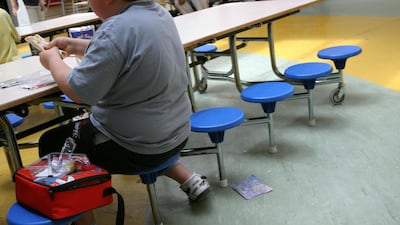UAE doctors have given a warning that children need more rest as evidence mounts of a connection between sleep and soaring obesity rates among children and young people.
A recent study by the University of Colorado, involving 177,000 respondents, found that insufficient sleep was associated with unhealthy dietary habits, such as skipping breakfast, the consumption of fast food. and eating sugary foods. It was also found to be associated with being overweight or obese.
The study follows a number of others that have come to similar conclusions, with UAE doctors warning that Emirati children are among those at risk.
While every country in the world is struggling with obesity, rates in the UAE are double the world average.
UAE health authorities estimate that up to 40 per cent of children are either overweight or obese, with the potential for it to lead to serious health conditions.
About 340 million children of school age and 41 million below the age of five worldwide are also overweight or obese, according to figures from the World Health Organisation.
_______________
Read more:
Special report: Obesity rate in the UAE double the world average
UAE's high child obesity rates blamed on technology
Fattest generation — millennials — could face cancer crisis, say UAE doctors
_______________
Dr Heather Wadams, consultant paediatric endocrinologist at Seha’s Mafraq hospital, said that lack of sleep is one of the factors behind adolescent and childhood obesity in the UAE.
“I find that children in the UAE stay up much, much later than they would in North America,” said Dr Wadams. Before moving to the UAE, she said she had “never heard of children staying up until dawn”.
However, she also said that healthcare professionals still do not know exactly why a lack of sleep contributes to obesity.
Some research suggests that it causes a hormonal imbalance, promoting the release of more hunger hormones and lowering the amount of hormones that tell your body you are full. It also seems to contribute to insulin resistance.
Even adults are susceptible to weight gain and have difficulty losing weight if they do not get enough sleep.
The recommended amount of sleep for children between the ages of six and 13 is usually between nine to 11 hours per night.
“Adolescents actually need more sleep than adults because they are developing so they need more sleep than we think. I would love to see children here go to bed at 9pm at the latest and wake up at 6am for school.”
However, she says a common pattern she sees in the UAE instead is children going to bed between 11pm and midnight and waking up at 5.30am. Then they catch up on some sleep after school.
Dr Abdullah Al Jneibi, consultant paediatric endocrinologist at Burjeel Day Surgery Centre said being awake for longer hours would cause a person to eat more.
“The more hours you remain awake, the more likely you will spend your time eating and craving food. Our bodies are made so that we function during the day and rest at night.”
He said he was seeing an increasing number of obese children who are not sleeping the recommended number of hours a day.
“It is a trend. Children who don’t get enough sleep have a problem managing their weight.”

